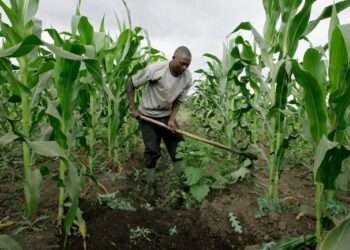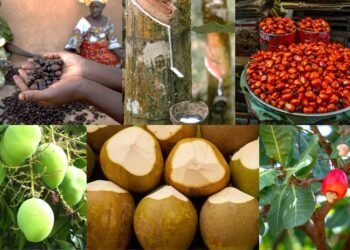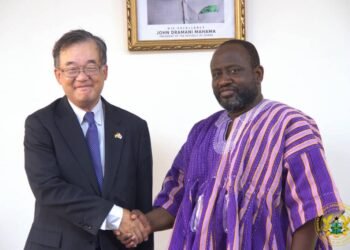Ghana, one of the world’s leading cocoa producers, is facing a severe financial blow as illegal mining activities, adverse weather conditions, the Cocoa Swollen Shoot Virus Disease (CSSVD), and rampant smuggling have collectively slashed the country’s cocoa revenue by over $500 million in the first quarter of 2024.
This alarming decline, as reported by the Bank of Ghana, highlighted the multitude of challenges that the cocoa sector is grappling with, jeopardizing the livelihoods of farmers and the national economy.
Fiifi Boafo, Head of Public Affairs at the Ghana Cocoa Board (COCOBOD), has provided an in-depth explanation of the key factors driving this substantial revenue loss.
Among the most pressing issues is the illegal mining, or “galamsey,” which has severely disrupted cocoa farming operations. “Illegal mining activities are cutting off farmers from their farms,” Boafo stated, emphasizing the significant impact of these activities on cocoa production.
The environmental degradation caused by illegal mining is particularly detrimental, with polluted water bodies making irrigation increasingly difficult for cocoa farms. “Illegal mining activities are polluting water bodies needed to irrigate cocoa farms,” Boafo noted, highlighting the compounded challenges faced by farmers.
Adverse weather conditions have also played a critical role in the revenue decline. The El Niño phenomenon, known for causing warmer and drier conditions, has led to significantly lower cocoa yields.
Mr. Boafo pointed out that the unfavorable weather patterns have further strained an already struggling sector, reducing the overall productivity of cocoa farms. The dry conditions not only affect the growth of cocoa pods but also exacerbate issues related to water availability, making it harder for farmers to maintain their crops.
Compounding these challenges is the devastating impact of the Cocoa Swollen Shoot Virus Disease (CSSVD), which has ravaged over 500,000 hectares of cocoa farms. “Over $200 million was spent to rehabilitate farms affected by Cocoa Swollen Shoot Virus Disease,” Boafo explained, underlining the extensive efforts and resources required to combat the disease.
The CSSVD not only reduces the quantity of cocoa produced but also necessitates substantial financial investments to rehabilitate affected farms, further straining the sector’s resources. The disease has decimated large swathes of cocoa plantations, leading to significant losses in production and income for farmers.
Rampant smuggling of cocoa beans across borders has added another layer of complexity to the revenue crisis. The illegal export of cocoa beans deprives the country of valuable foreign exchange earnings and exacerbates the financial difficulties faced by the cocoa industry.
Smugglers often take advantage of price differences between Ghana and neighboring countries, leading to significant losses for local farmers and the national economy. This illicit trade undermines the efforts of COCOBOD and other stakeholders to stabilize the cocoa market and ensure fair prices for farmers.
COCOBOD’s Response Measures
In response to these multifaceted challenges, COCOBOD has implemented several measures aimed at mitigating the impact and supporting cocoa farmers. One of the key strategies employed by COCOBOD involves taking legal action against smugglers and illegal miners.
Mr. Boafo disclosed that “five individuals already jailed and several cases pending in court,” demonstrating the organization’s commitment to curbing these illicit activities. These legal actions are crucial in deterring further illegal activities and protecting the interests of cocoa farmers.
Financial support for farmers is another critical component of COCOBOD’s response strategy. “We are motivating cocoa farmers by paying them more for their produce,” Mr. Boafo stated, indicating efforts to provide financial incentives that can help sustain farmers’ livelihoods amid the ongoing challenges.
This support is essential for ensuring that farmers remain motivated and capable of continuing their cocoa farming activities. By offering higher payments for cocoa, COCOBOD aims to counteract the lure of smuggling and encourage farmers to sell their produce within the country.
Legal Assistance for Farmers
Furthermore, COCOBOD’s legal team is actively assisting farmers in prosecuting miners who interfere with their farms. “Our legal team is helping farmers who seek to prosecute miners who interfere with the usage of their farms,” Boafo said.
This legal assistance empowers farmers to take action against those who disrupt their farming operations, providing a crucial avenue for seeking justice and compensation. This support is vital in ensuring that farmers’ rights are protected and that they can continue their agricultural activities without interference.
Despite the production shortfall, COCOBOD remains optimistic about its ability to secure the necessary funding for the cocoa sector.
Mr. Boafo assured that the production shortfall would not affect COCOBOD’s chances of accessing the cocoa syndicated loan, indicating the institution’s confidence in maintaining financial stability and continuing its support for the cocoa industry.
This financial assurance is crucial for sustaining the sector through these challenging times and ensuring that farmers receive the necessary support.
Ghana’s cocoa sector is currently going through a complex web of challenges that have significantly impacted its revenue. However, with proactive measures and unwavering support from COCOBOD, there is hope for recovery in the face of these adversities. The concerted efforts to combat these issues and support farmers will be pivotal in restoring the vitality and sustainability of Ghana’s cocoa industry.
READ ALSO: Investors Run Away from Govt’s Short Term Debt Auction: A Telltale Sign of A Dying Economy?























